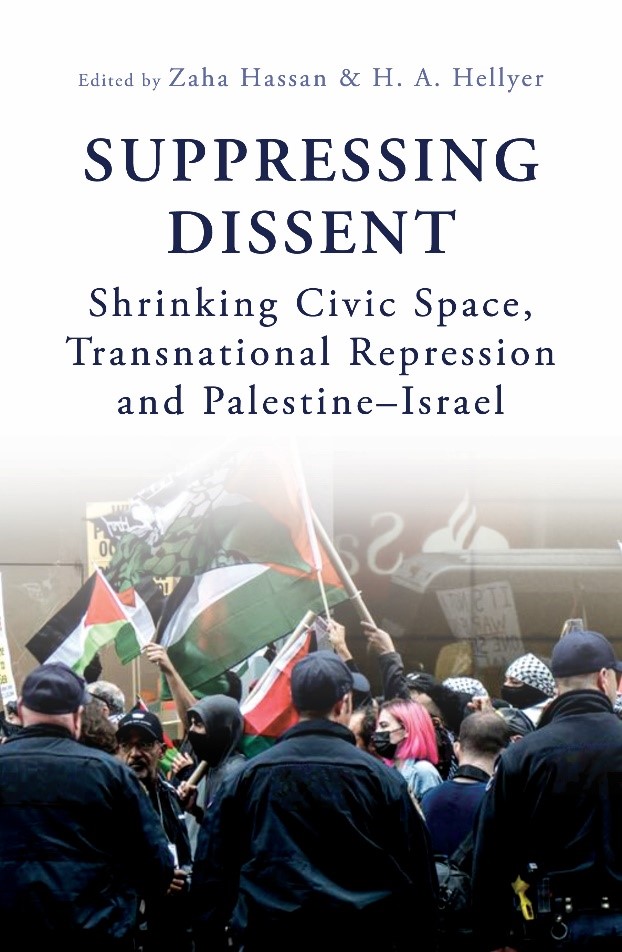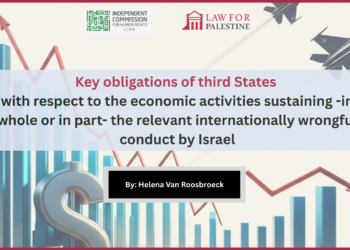Upcoming Book Release: “Suppressing Dissent” Examines Civic Space and Repression in Palestine – Israel
A new publication, Suppressing Dissent: Shrinking Civic Space, Transnational Repression and Palestine–Israel, edited by Zaha Hassan and H.A. Hellyer, will be released in November 2024 by Oneworld Publications as an open access resource. This comprehensive anthology explores the intersection of civil liberties, civic spaces, and transnational repression, with a particular focus on the impacts of Israel’s prolonged occupation of Palestine.
The book delves into how the entrenched apartheid regime in Israel and the ongoing occupation of Palestine are eroding civic spaces and undermining civil liberties, not only in the Arab Middle East but also in the United States. It argues that this repressive environment has triggered a broader campaign of transnational repression, where attempts to silence pro-Palestinian activism have extended beyond the region, affecting freedoms and civil rights globally. Against the backdrop of recent mass mobilizations and backlash, Suppressing Dissent offers critical insights into these pressing issues.
The entrenched apartheid regime in Israel and the ongoing occupation of Palestine are eroding civic spaces and undermining civil liberties, not only in the Arab Middle East but also in the United States.
Carnegie Fellow and human rights lawyer Zaha Hassan opens the book by asking why has protest related to Israel’s genocidal war in Gaza garnered so much backlash targeting only one side of the debate resulting in the arrest of students and faculty, removal of protest encampments, Congressional hearings on antisemitism, and a ban on TikTok.
The book is divided into three parts. Part I provides a deep dive into the state of Palestinian and Israeli civil society, with contributions from experts such as Nathan J. Brown, Dana El Kurd, and Dahlia Scheindlin. They trace how these societies have evolved under the weight of Israel’s occupation.
Part II examines the various legal and political tools used to suppress speech and activism, including counterterrorism laws and overbroad definitions of antisemitism, as explored by contributors such as Diala Shamas, Nour Soubani, and Lara Friedman. It also highlights the financial restrictions imposed on Palestinian organizations through banking regulations and restrictions on financial transactions, as well as the growing role of social media censorship and Israeli surveillance technologies -now increasingly adopted by other states-in silencing pro-Palestinian advocacy.
In Part III, the authors analyze how these tactics to control speech and activism on Palestine/Israel operate within specific communities in the United States and are deployed across borders. Yousef Munayyer, Maya Berry, Marwan Muasher, and Rafiah Al Talei examine their impact on Arab American activism and the state of civic space in the MENA region.
Suppressing Dissent concludes with reflections by H.A. Hellyer on the broader implications of shrinking civic spaces for the Israeli-Palestinian conflict and the global impact on democracy and human rights. The book has already garnered praise from prominent voices in the human rights community. Tess McEnery of the Middle East Democracy Center and Sarah Yager of Human Rights Watch both describe it as an urgent and essential read, highlighting how shutting down discussion fuels anger, limits cooperation, and undermines the possibilities for peace.
As the editors argue, the issues unfolding in Palestine resonate far beyond its borders. Policymakers must recognize the suppression of civic freedoms and rising repression concerning Palestine/Israel, as these issues complicate efforts to end the occupation, enable human rights abuses and war crimes, and undermine US policy objectives. Furthermore, this repression distorts civil liberties and democracy not only in the US but globally. Therefore, increased debate and discussion on policies related to Palestine/Israel are essential.
The book will be available for free through Oneworld Publications later this year.





